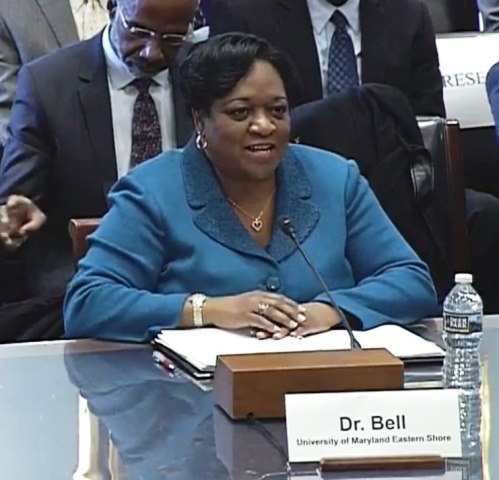Wednesday, December 7, 2016
Bell urges Congress to provide 1890 land-grants with scholarship help

PRINCESS ANNE, MD – (Dec. 7, 2016) – UMES President Juliette B. Bell testified today before a Congressional committee where she urged it to fund scholarships specifically for minorities who want to pursue careers in agriculture.
“The agriculture field has evolved greatly,” Bell told the U.S. House of Representatives’ agriculture committee, “and there are many opportunities for our students to explore the use of technology and to learn what modern agriculture is all about.”
Bell was among three historically black institution presidents who addressed the U.S. House of Representatives’ agriculture committee in support of a proposal calling for Congress to provide $1 million annually to each of the 19 land-grant schools founded to offer blacks agriculture training following the Civil War.
“We want to be able to increasingly provide that opportunity to more students of African-American descent and help them to be part of the American dream,” Bell said.
Rep. David Scott, D-Ga., lead sponsor of the funding resolution , wants the federal aid to be committed for the so-called “1890 institutions” for at least five years.
“This bill will provide the 1890 universities,” Bell said, “an opportunity to provide some financial support to those students who are academically well prepared, but not economically prepared to sustain their educational experience.”
An aide to Scott said the Georgia Congressman wants future generations of farmers to be well-trained without burdensome college loan debt ready – and ready to replace America’s aging population of agri-businessmen and women.
“We know that the workforce is underrepresented in terms of African-Americans in agriculture,” Bell said. “We also know that the workforce is graying, especially in agriculture.”
“It is important for students know that agriculture is a career they can pursue and that there are jobs,” she said.
Scott told his colleagues the start of the hearing that it was an “historic moment for African-American colleges” and that his proposal would be a boost to “the most important industry in the world.”
“There is no greater need in the African-American community … then education and job training,” Scott said.
Bell and her colleagues, Cynthia Jackson-Hammond, president of Central State in Ohio, and Paul Jones, president of Fort Valley State in Georgia, fielded mostly friendly questions from committee members seeking details about how their respective schools’ current resources and challenges they face recruiting, retaining and training students.
At least two committee members, however, expressed concern that allocating the scholarship money sought by Scott for historically black institutions meant it would go exclusively to African Americans.
Bell explained that UMES is one of the nation’s most diverse historically black universities and that financial aid it doles out goes to the most deserving students, regardless of the race. Her colleagues concurred. The three also agreed that keeping students in school is often complicated by their inability to afford more than a year or two of study.
“This bill will provide our universities, which are often not able thorough endowments and private funding to be able to provide that level of support … to these very deserving students – not just to help them get a degree but to address the workforce needs and economic development of our region and our country,” Bell said.
Because the 114th Congress is about to disband, pending legislation like Scott’s funding resolution will have to be resubmitted when the next Congress is sworn into office in January.
Nevertheless, committee chairman Michael Conaway, R-Texas, expressed optimism that the college presidents’ testimony would be helpful in guiding the agriculture committee in deciding whether to support Scott’s proposal.
The entire 2-hour 28-minute hearing can be viewed on YouTube HERE.
Bill Robinson, director, UMES Office of Public Relations, 410-621-2355.

